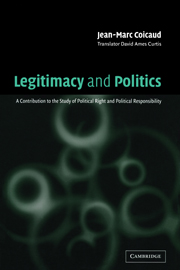Book contents
- Frontmatter
- Contents
- Translator's foreword
- Acknowledgements
- Introduction
- 1 What is political legitimacy?
- 2 Controversies around political legitimacy
- 3 Modernity, rationality of the social sciences, and legitimacy
- 4 Social sciences, historicity, and truth
- 5 Study of politics, relation to history, and de jure judgement
- 6 Community experience, dynamic of possibilities, and political legitimacy
- Conclusion
- Bibliography
- Index
6 - Community experience, dynamic of possibilities, and political legitimacy
Published online by Cambridge University Press: 22 September 2009
- Frontmatter
- Contents
- Translator's foreword
- Acknowledgements
- Introduction
- 1 What is political legitimacy?
- 2 Controversies around political legitimacy
- 3 Modernity, rationality of the social sciences, and legitimacy
- 4 Social sciences, historicity, and truth
- 5 Study of politics, relation to history, and de jure judgement
- 6 Community experience, dynamic of possibilities, and political legitimacy
- Conclusion
- Bibliography
- Index
Summary
In order to show that it is possible to reconcile the idea of truth with the plurality of historical reality and therefore to think that the diversity of ways of life and the changes that intervene do not rule out the existence of limits to what is politically acceptable, we must complete the arguments offered up till now with a reflection upon community experience. When individuals are sufficiently integrated into a given community, so that they identify with it and are aware of their rights and duties, they have an experience of the just or unjust character of their situation as well as of the responsibility incumbent upon those who govern.
This reflection will take place in three stages. First, it will be shown that the question of practical truths is tied to the domain of meaning and possibilities, which is deployed within the social field. Next, the theme of the judgement of legitimacy will be broached by examining community experience in relation to the dynamic of possibilities. Starting from the idea that one's feeling of belonging to a collectivity cannot be separated from the way in which individuals perceive their rights and their duties, it will be noted that this situation supposes that political institutions are capable of taking note of eventual changes in possibilities and of their impact as they are realised, when these possibilities are conceived by agents as being essential to their well-being.
- Type
- Chapter
- Information
- Legitimacy and PoliticsA Contribution to the Study of Political Right and Political Responsibility, pp. 205 - 236Publisher: Cambridge University PressPrint publication year: 2002



